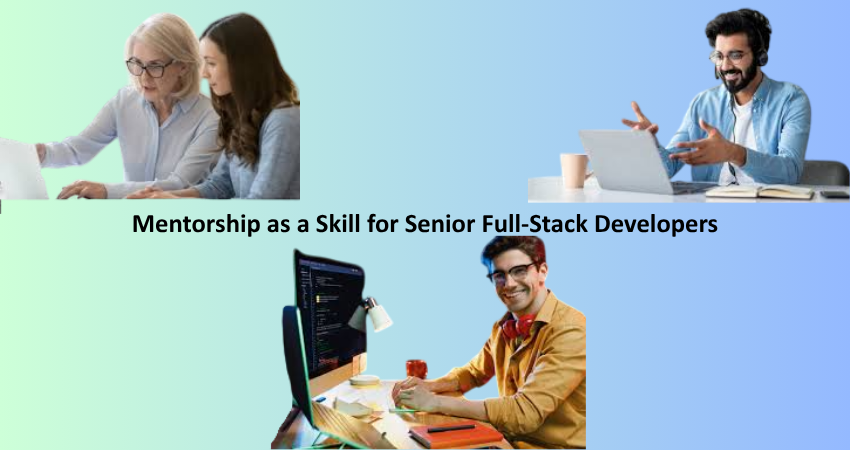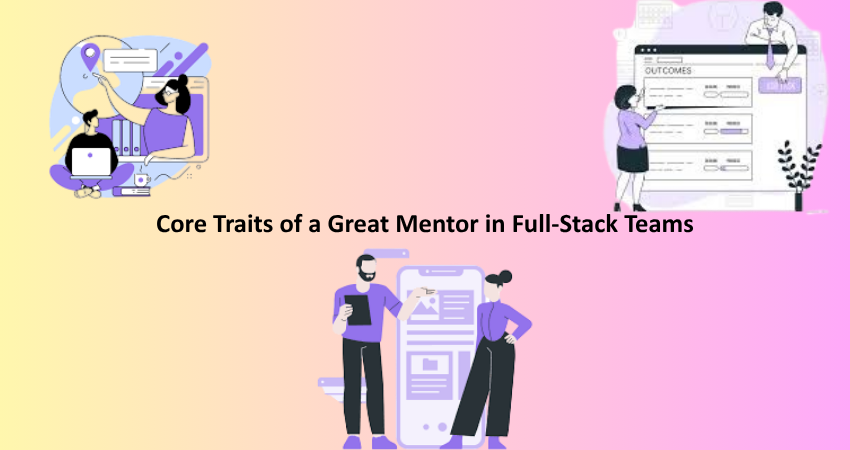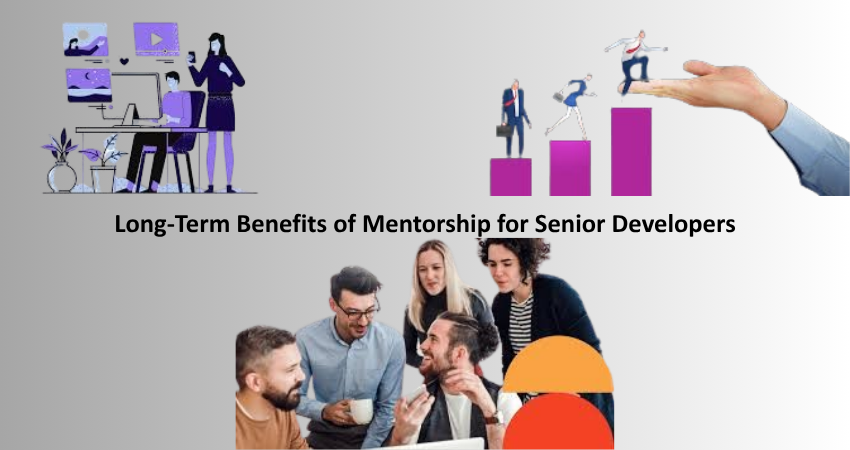
Introduction
In the rapidly changing environment of software development, the expectations of senior full-stack developers extend well beyond coding. While technical skills remain valuable, soft skills like leadership, collaboration, and mentorship are increasingly becoming valuable differentiators. Mentorship is unique among these skills. It provides development opportunities for junior developers and develops the leadership and communication of the mentor. Mentorship for senior full-stack developers should transfer holistic software architectures, design patterns, team workflows, and standards across front-end and back-end technologies.
Mentorship also serves as a strategic lever for individuals, teams, and organizational growth. Mentorship supports a knowledge sharing culture and provides continuity in projects by mitigating the knowledge gap. In addition, having senior developers who can coach junior team members, drives organizational, long-term performance gains because they develop their capabilities, as well as confidence. The mentorship relationship also reaffirms the senior’s expertise because being articulate about concepts and coaching other developers increases their own understanding of the technologies and frameworks. Mentorship is therefore not just about mentoring but also about developing a skill that multiplies leverage across teams and projects.
Why Mentorship Matters in Full-Stack Development
Building a Stronger Team Culture
A robust mentoring environment can actually change the dynamics of a full-stack development team. Because full-stack developers communicate and collaborate across both the front-end and back-end portions of an application, often interacting with UI/UX designers, database engineers, and DevOps professionals in the process, they can also represent the connection between all team roles as a member of an interdisciplinary team. In mentoring junior developers, senior developers create connection points for other team members that eliminate silos of knowledge, and promote shared ownership of a product that establishes a collegial mindset. Together, this can provide a sense of unity against-taking a top-down perspective—lowering friction, and improving team morale.
Mentorship also establishes resilience within the team by normalizing a smoother onboarding process. Junior developers that are being coached from a senior developer can feel more apt to contribute, make decisions, and ask questions. With years at the same organization, junior developers that see senior developers aptly mentoring internally generate decreases in turnover, learning cycles, and cross-team collaboration. Junior developers will not have to navigate straight to learning documentation or a trial-and-error process experience instead, they get access to professionals with years of experience in front or back-end development. This human aspect creates real trust between junior and senior developers and normalizes dialogue and questioning—essential elements for high-quality software delivery in an agile approach.
Transferring Institutional Knowledge
Institutional knowledge is the unwritten experience and insight that is locked in the minds of senior developers. From architectural choices to coding standards to deployment specifics, this information is often not recorded, so the senior developer’s role has a key aspect of mentorship that passes this important knowledge to new team members. Senior full-stack developers have a unique opportunity to transfer knowledge with context, like how some framework was choose over others, the reasons for legacy systems being built in a certain fashion, etc. This transfer of evolving lineage is key to avoid incurring much larger and costly mistakes, and maintaining the overall technical integrity of the codebase into the future.
As discussed previously, mentorship also extends to the vision of culture within the organization, and other key traits like client expectations and stakeholder management. Because full-stack developers experience so many phases of the development cycle from planning, design, development, deployment, and maintenance, they have the full, broad experience that is most valuable to junior team members. With the formality and cadence of mentorship, full-stack developers will share their knowledge and libraries of experiences so that the next generation developers don’t just understand “how” things are done, but “why” each decision was made. This leads to accelerated levels of professional maturity that will help prepare the mentee for a leadership role in the future.
Core Traits of a Great Mentor in Full-Stack Teams

Technical Breadth and Depth
To be a great mentor, a senior full-stack developer must also understand the technical knowledge contained in all four domains of the full stack. This breadth of knowledge allows the mentor to speak with some level of confidence about everything throughout the full stack. The senior developer should be able to talk about client-side frameworks (like React or Vue), server-side technologies (like Node.js or Django), databases (like PostgreSQL or MongoDB), and CI/CD pipelines (which may or may not also refer to continuous development). Technical breadth allows the mentor to help the mentee through tricky debugging exercises and suggest architecture improvements, if needed, all while being able to demonstrate that this is not out of the realm of possibility. Without a solid technical grounding, it can be easy to become too vague, and at best unhelpful, or simply make the mentee confused, either is a potential risk.
But being an expert does not mean the mentor has found the ability to mentor. Its one thing to know a lot and its another to be able to convert knowledge into a digestible and equatable knowledge system. Senior developers have to take into account that a mentees learning curve is not the same as theirs and know when to provide the necessary level of explanation. To develop the required empathy and patience to allow flexibility in the mentoring process takes time. When a mentor works out solutions to problems with a senior developer in a slow and methodical manner, the junior developer learns the current issue, of course, but they should also be learning a way of thinking about similar problems. Hence, it is a combination of technical proficiency and ability to instruct that distinguishes a great mentor.
Communication and Empathy
Communication skills underpin effective mentoring. Senior full-stack developers should express clarity in technical discussions, level the type and quality of questions they ask, and provide specific constructive feedback with an absence of condescension. Good mentors are active listeners and provide a sense of psychological safety, allowing their mentees to freely express doubt, seek clarification, or reveal that they may not understand something. Psychological safety is critical for the creative or problem-solving work set that software developers need to overcome.
Empathy as a communicator raises the communication standard. A mentor who recalls their own frustrations with learning new frameworks or deciphering unfamiliar and somewhat eclectic error messages will be continually compassionate with junior developers. Rather than create an environment where junior developers feel pressured with jargon and the speed at which they execute tasks, empathetic mentors create an authentically engaged learning process through exploration. The mentor serves as a guide, to instill confidence in their mentee, while adjusting the level of responsibility. In the end, communication and empathy go hand in hand to develop a productive, respectful and growth-oriented mentor-mentee relationship.
Practical Mentorship Strategies for Senior Developers
Pair Programming and Code Reviews
One of the best ways to provide mentorship is through pair programming. This allows mentors to show good coding practices, good design patterns, good debugging, etc. As they are writing code together, they address the junior developer not just from the “what” perspective but also from the “why”.This interactive mentorship style implements immediate feedback loops, the ability to solve problems together in real-time, and gives a feeling of shared ownership of code. Mentors can also see patterns of flashing issues, clarify gaps in understanding, and suggest better alternatives right away.
Code reviews, when used effectively, are another opportunity to provide mentorship that is sometimes lost in traditional mentoring/coding relationships. Oftentimes, we’ve seen where reviews simply become quality control inspections. Senior developers must understand their review process as a mentorship moment. For senior developers to, at a minimum, understand, not just “what” is preferred but “why” it is preferred. The senior developer can discuss an alternative solution with the junior developer to highlight trade-offs in understanding a better approach to the development task. When this perspective is used, positive framing for mentorship, on the guidance of another developer, junior one, the mentee is able to grow faster than they may otherwise on their own. Further, over time, there are principles of good software development practice that would be internalized by the mentee, and they become more proactive, incorporated into their toolbox of development strategies that will elevate the code quality and development practice of the entire team in a positive way.
Setting Goals and Tracking Progress
Mentorship can lose steam very quickly without guidance. Setting clear learning goals is critical. Senior developers can partner with their mentees to set certain goals/outputs—the goals and experiences will vary from person to person, but could include mastering a framework, understanding the guiding principles of testing, or coding contributions to a prominent module of a framework. Clear learning goals provide opportunities for goal-directed activities, new accountability for both partners, and evidence of progress in learning. These goals also allow for mentors to identify the unique experiences and knowledge base of their mentees in order to structure their mentorship accordingly.
Tracking all of the progress ensures the mentorship does not become stale. Frequent check-ins, one-to-one meetings, or informal syncs allow both partners to assess what’s working, what’s blocking progress, and how to change plans if needed. Maintaining mentorship logs, a learning journal, or some sort of task board, can all help to keep visible progress for mentees and motivate them to continue pushing into unchartered waters. For mentors, it is an opportunity to relish in small victories and leverage learning, as well as tweak or change plans based on situational feedback. Planned mentorship doesn’t just make better developers; it creates better leaders!
Common Challenges in Mentorship and How to Overcome Them
Balancing Mentorship with Development Duties
Senior full-stack developers often strive to balance helping others with their own workload, and we appreciate how factors like tight deadlines, high-impact projects and complex codebases often do not make this easier. While it is easy to say you value mentoring, many can only find time to mentor informally and when it becomes reactive or sporadically, any time spent become very superficial. However, we notice that when organizations and individuals frame mentoring as a more ‘core’ part of the job as opposed to a ‘side task’ they can find a more sustainable place for it within the contexts of their daily work.
By embedding mentoring moments into existing ceremonies (e.g., sprint planning, daily stand-ups or code reviews). Instead of just completing the ceremony as an activity, senior developers can consider them as mentoring moments through interaction. Organizations can also suggest mentoring as part of performance reviews and promotion criteria. When mentoring is institutionalized rather than optional, it receives the due time, attention and respect it deserves. In the end, a commitment to time invested in mentoring leads to more self-sufficient, skilled and aligned teams.
Managing Different Learning Styles
Another obstacle that arises in mentorship is acknowledging everyone’s different ways of learning. A developer is not a developer, meaning that some developers learn best through hands-on experience while others flourish best when they practice tutorials or when there is a good set of documentation. Therefore, if the mentor only mentors in one way, the mentee won’t engage properly, they could become frustrated, or they won’t feel they are progressing. If a mentor is going to be of assistance, they MUST assess how the mentee learns best and cater to that style. They might need to change the way they communicate, including their resources, or they might need to change the speed of their sessions.
Also, knowing the personality traits is important as well. For example, an introverted mentee may typically take considerably longer at processing an idea, while they may not comfort to overwhelming amounts of pair programming. On the other hand, a very analytical mentee might engage in a multitude of questions taking up an ample of time before acting. Flexibility, observation, and feedback are essential in are key tools in navigating through all this. A senior developer should create a personalized road map for each one of their mentees as this will help them improve their mentorship experience, otherwise it could be a waste of time and less engaging for them.
Long-Term Benefits of Mentorship for Senior Developers

Enhancing Leadership and Influence
Mentorship is not only personally beneficial for the mentee; it also greatly develops the mentor’s own leadership skills. When senior full-stack developers teach people, they are required to give their thoughts a name, put their assumptions under scrutiny, and recall how they reached decisions in the past—this is personally empowering and re-enforces their ability to lead, communicate, and speak to best practices. Each time you mentor a developer, you will also learn how to make an unsafe influence, effectively delegate, and mediate—intelectual tools that pay tremendous diversity in tech leadership roles, for team leads and engineering managers alike.
Good mentors are often identified as thought leaders in their organizations, particularly over time. For mentors who value diversity, their influence may develop like the education leader who develops a reputation for being the go-to person for advice, insights, and courteous innovation. The additionally visible occupations may accelerate a mentor’s career trajectory, because additional recognition or more strategic roles often come with bonuses to acknowledge them being more seen in action. The additional pattern of being publicly seen as one who lifts others, regularly elevates the mentor’s professional brand externally and internally. Something that holds value within an industry where every piece of tech who accesses and get technical skill and craft. Mentorship may equally be the last remaining impact that persuades inexperienced developers from their position as a senior developer.
Leaving a Lasting Legacy
The perhaps greatest benefit of mentorship is the legacy that it produces. Great mentors create more than lines of code; they create people who are better, smarter, and more capable than they otherwise would have been. For senior full-stack developers, this is lasting impact on both the code and the people who are building that code. They are engaged in the future of their teams and the culture they are building, which embodies a value of growth, curiosity, and collaboration.
That legacy does not stop with the organization. Mentees will go on to mentor their own mentees, creating a ripple effect capable of vastly expanding those same positive values and practices throughout the developer community. And some mentors will explicitly document and publish their mentorship, through blogging about their experiences, offering talks, and contributing to open-source, which makes their impact and legacy even bigger. When you break it down, mentorship is about creating value; what starts as a simple mentor-mentee relationship can spiral into a valuable contribution to the field of software development.
Conclusion
Mentorship is not simply a nice-to-have experience for senior full-stack developers; it is a core competency that benefits both individual careers, and organizational success. Mentorship helps fill a void of knowledge transfer, it develops talent, and it brings a sense of togetherness. Through mentorship, senior developers do not simply watch their mentees develop; they too are developing a greater knowledge of technical abilities and interpersonal competencies. From enhancing team culture, to leaving a legacy, mentorship provides a wealth of benefits.
In a quick-paced world of full-stack development, thick with emerging frameworks and new trends, the only constant is people. The act of investing time and brainpower into mentoring others is one of the most significant contributions a senior developer can offer. As technology continues to advance, it will be the mentors who, while nurturing the next generation of developers, will help reinvent software as an industry, through their efforts of mentoring.